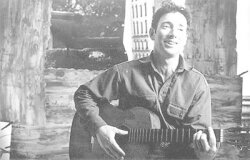Jonathan Richman is so confusing
For more on Richman and how he fits into the cult of importance, check out Thomas Fallace’s essay on page 43.—ed.
Known for a pair of pop music singularities divided by two decades, the first “important”— 1976’s cultish, canonical The Modern Lovers, which wore its heart and Velvet Underground influence on its amps (VU’s John Cale also produced)— the second widely seen and just as noticed— his absurd turn as the musical narrator (inspired by Nat King Cole’s role in the film Cat Ballou) in the Farrelly brothers’ There’s Something About Mary, Jonathan Richman treated the half capacity crowd at Starr Hill to slim-to-no whiffs of either.
If you’re familiar with Richman (known as Jojo to many of his small but loyal following), his performance, which drew mostly on material between the two benchmarks and some on his post-Mary output, came as no surprise.
His Mary contributions rarely make themselves known live (perhaps because they’re largely inconsequential), while he has almost entirely disowned his first and loudest album, though a segment of his audience pines for its kinda sorta protopunk vigor. One of the few tunes from his debut that’s survived the disavowal, the sneering “Pablo Picasso” (“Pablo Picasso never got called an asshole/Not like you!”) did not make an appearance, despite shouted requests.
The battle of volume— a battle Richman typically showed no interest in waging— was won decisively by the audience. Richman, armed with an undersized guitar he played sans pick, and drummer Tommy Larkins, who’s added surfaces to the kit he plays standing up while keeping the efficient poker face style, were outgunned by chatter that didn’t limit itself to the back of the club. Even if you knew the words, standing 40 feet back, you still couldn’t make them out. This had something to do with his funny disregard for the microphone, which often got ignored in favor of his trademark stunted dance moves.
Essentially a live performer (he’s churned out more than his share of albums on roughly five labels, but concerts weigh more heavily in both his and his fans’ minds than the studio efforts, where he usually rerecords a number of old songs, with slim alterations), he ignored the ignorers for a stretch.
However, the accurate rep on Richman is that as the audience goes, so goes Jojo.
So it could’ve been simply a slow night that led to a string of his midtempo sad sappy sucker ballads to women who wear heavy makeup (“Vampire Girl”), women who wear none (“Her Mystery Not of High Heels and Eye Shadow,” the title track from his latest CD), various zones (financial, industrial), and on the perils of poor communication (“To Hide a Little Thought”).
But, no, of course it couldn’t. Keeping up with his idiosyncrasies can be difficult both for the audience and for Larkins. Richman treats his songs like skeletons, adding and subtracting verses, substituting moist-eyed struts for choruses, and bleeding songs— which often don’t sound that dissimilar in the first place— into one another. Larkins trained a constant gaze on him to gauge their heading. The audience didn’t, so towards the end of the night Richman— quietly, forcefully, stammering— asked them if they liked him, and if they wanted him to keep going.
Here we hit on the both the appeal and the distance of Jonathan Richman. He’s a big weirdo. Try to imagine anyone having the humility and the balls to pull this— Creed? Britney? Jay- Z!? Never.
It’s the kind of gesture that simultaneously puts the show in the hands of the audience— do they care enough to make him feel wanted? (they did)— and lets the audience know who’s in charge— he can go on or not, doesn’t matter. I don’t think I was hearing things when I made out Richman mumble, “I live my life the way I want,” at the end of what would have been a diatribe on different lips. And anyway he didn’t need to say it.
Richman’s a consummate performer, which implies that, like most of us, he’s both utterly natural (“I’m straight!” he famously shouts in an anti-hippie, anti-drug tune from his debut, and his casual manner shouts it still) and completely mannered. With his wet eyes and happy, expectant look, he’s always asking if the audience digs him, whether he’s telling a stock anecdote to set up “You Can’t Talk to the Dude” (“Yeah, he wants you,” he says to a girl saddled with a rock and roll-type boyfriend. “He wants you to make his flyers, wash his clothes, carry his gear, do his dishes”), or singing a song in Spanish that most can’t comprehend.
This strategy’s awkward ‘cause, in its exaggeration, I see what’s a bit uncomfortable: I can’t help but be anybody but me, but being “natural” entails countless decisions. What’s really strange, and sorta creepy, is the way Richman focuses his savant-like tunnel vision on his likes and dislikes (the only subject of his songs). He played the acoustic disco crowd fave “I Was Dancing in the Lesbian Bar,” in which he leaves a bum nightspot where things are “just okay” for one where things “were more my way.” He dances, he feels free, he has fun. Lesbians figure not at all in the story— he might as well be at a klezmer bar.
Similarly, he usually digs on things (“French style, what eez et?/Something kind of delicate” is his bizarre affection for the Gauls), not people. (When he does like someone, it’s also often described in terms of objects, like eye shadow and heels.) If you’re a Jojo fan, you probably couldn’t care less— it’s Jonathan being Jonathan. Same if you’re a hater. If you’re in the middle, though, geez. He’s sweet and hilarious and unlike anybody else. But what’s his deal?
